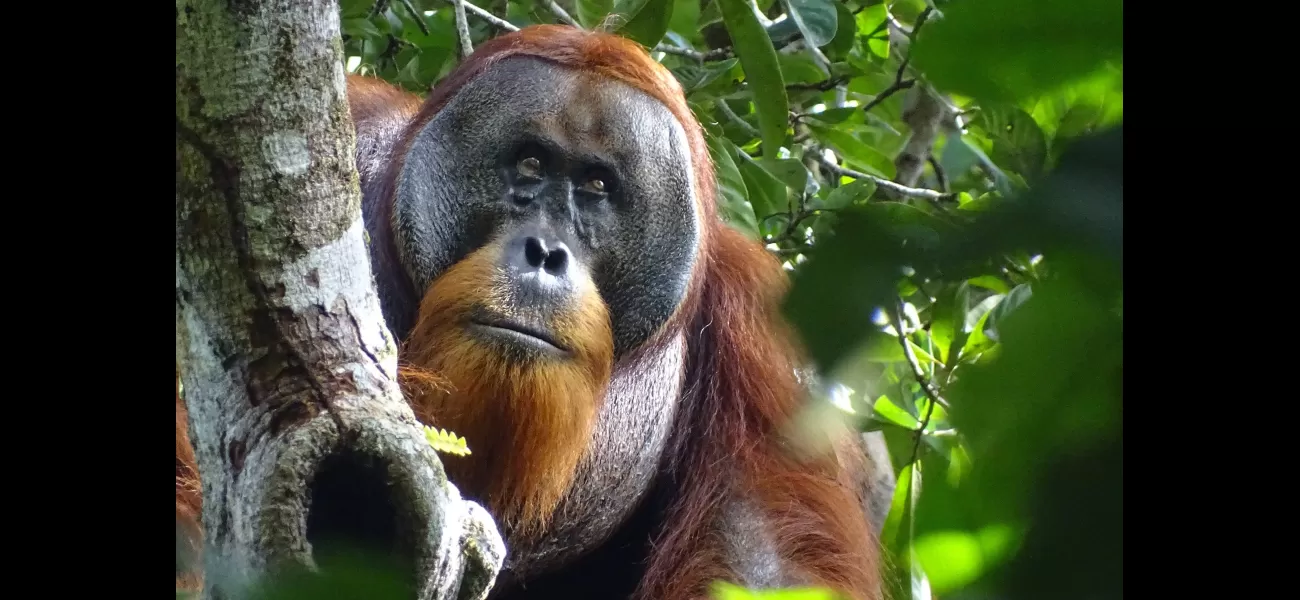Incredible orangutan exhibits unprecedented human-like behavior in groundbreaking discovery.
He's almost a doctor.
May 2nd 2024.

In a groundbreaking discovery, a male orangutan named Rakus was observed using medicinal plants to treat a wound on his face. This wild Sumatran orangutan was seen chewing leaves and applying the sap to the injury, before covering it with chewed-up leaves like a makeshift bandage. The plant used, known as Akar Kuning, is known for its anti-inflammatory and pain-relieving properties, and is commonly used in traditional medicine for ailments like diabetes and malaria.
Remarkably, after just five days of treatment, the wound showed no signs of infection and had completely healed within a month. Rakus was back to his usual handsome self, feeling healthy and strong. The findings, published in the journal Scientific Reports, are the first to show a wild animal using a plant with known medicinal properties for healing purposes.
The astonishing behavior was observed by Dr. Isabelle Laumer and her team while studying orangutans in the protected Suaq Balimbing research site within Indonesia's Gunung Leuser National Park in 2022. This area is home to around 150 critically endangered Sumatran orangutans. Rakus, who had sustained the wound in a fight with another male, was seen chewing on Akar Kuning stem and leaves and applying the liquid onto his wound for seven minutes. He then continued to feed on the plant for over 30 minutes, before smearing the chewed leaves onto his injury.
Dr. Laumer and her team believe that Rakus was intentionally treating his wound with the Akar Kuning plant, as he only applied it to his facial wound and no other body parts. The fact that he repeated the behavior several times over a long period suggests that he was aware of the plant's healing properties and was intentionally using it to aid in his recovery.
It is still a mystery how Rakus learned this behavior, but it is believed that wound treatment may have emerged in a common ancestor of humans and great apes. Other great apes, such as chimpanzees, have also been observed using plants for medicinal purposes, suggesting a possible shared evolutionary trait.
Further analysis of the Akar Kuning plant used by Rakus revealed its many benefits, with high levels of compounds known to have antibacterial, anti-inflammatory, and antioxidant properties. It is possible that Rakus instinctively knew the plant's healing properties and was drawn to it for self-medication.
During his recovery, Rakus was seen resting more than usual, which is believed to have aided in his wound healing. Dr. Laumer explains that sleep can positively affect wound healing, as it increases hormone release and protein synthesis. Rakus's behavior appeared to be intentional, as he selectively treated his wound and no other body parts with the plant's juice.
Although this behavior has not been observed before, it is possible that other orangutans in Rakus's natal population also use plants for wound treatment. Orangutans, like Rakus, disperse from their natal area during or after puberty, making it possible that this behavior is present in other populations outside of the study area.
While humans have been using plants for wound treatment for thousands of years, this behavior is not exclusive to humans. The team believes that there may be a common underlying mechanism for the recognition and application of substances with medicinal properties to wounds, shared by our last common ancestor with great apes.
Overall, Rakus's behavior has shed light on the incredible intelligence and resourcefulness of orangutans. It is a reminder that we share a common bond with these magnificent creatures and that there is still much to learn from them.
Remarkably, after just five days of treatment, the wound showed no signs of infection and had completely healed within a month. Rakus was back to his usual handsome self, feeling healthy and strong. The findings, published in the journal Scientific Reports, are the first to show a wild animal using a plant with known medicinal properties for healing purposes.
The astonishing behavior was observed by Dr. Isabelle Laumer and her team while studying orangutans in the protected Suaq Balimbing research site within Indonesia's Gunung Leuser National Park in 2022. This area is home to around 150 critically endangered Sumatran orangutans. Rakus, who had sustained the wound in a fight with another male, was seen chewing on Akar Kuning stem and leaves and applying the liquid onto his wound for seven minutes. He then continued to feed on the plant for over 30 minutes, before smearing the chewed leaves onto his injury.
Dr. Laumer and her team believe that Rakus was intentionally treating his wound with the Akar Kuning plant, as he only applied it to his facial wound and no other body parts. The fact that he repeated the behavior several times over a long period suggests that he was aware of the plant's healing properties and was intentionally using it to aid in his recovery.
It is still a mystery how Rakus learned this behavior, but it is believed that wound treatment may have emerged in a common ancestor of humans and great apes. Other great apes, such as chimpanzees, have also been observed using plants for medicinal purposes, suggesting a possible shared evolutionary trait.
Further analysis of the Akar Kuning plant used by Rakus revealed its many benefits, with high levels of compounds known to have antibacterial, anti-inflammatory, and antioxidant properties. It is possible that Rakus instinctively knew the plant's healing properties and was drawn to it for self-medication.
During his recovery, Rakus was seen resting more than usual, which is believed to have aided in his wound healing. Dr. Laumer explains that sleep can positively affect wound healing, as it increases hormone release and protein synthesis. Rakus's behavior appeared to be intentional, as he selectively treated his wound and no other body parts with the plant's juice.
Although this behavior has not been observed before, it is possible that other orangutans in Rakus's natal population also use plants for wound treatment. Orangutans, like Rakus, disperse from their natal area during or after puberty, making it possible that this behavior is present in other populations outside of the study area.
While humans have been using plants for wound treatment for thousands of years, this behavior is not exclusive to humans. The team believes that there may be a common underlying mechanism for the recognition and application of substances with medicinal properties to wounds, shared by our last common ancestor with great apes.
Overall, Rakus's behavior has shed light on the incredible intelligence and resourcefulness of orangutans. It is a reminder that we share a common bond with these magnificent creatures and that there is still much to learn from them.
[This article has been trending online recently and has been generated with AI. Your feed is customized.]
[Generative AI is experimental.]
0
0
Submit Comment





